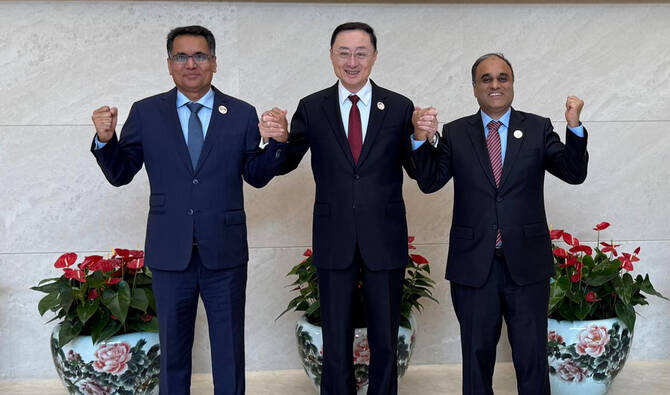Beijing/Kunming: The first official tripartite meeting was held between China, Pakistan and Bangladesh on Thursday in Kunming city of China. This historic meeting was held aimed at promoting mutual cooperation, regional stability and development between the three countries, which has given a new direction to China’s diplomatic activity in South Asia and neighboring regions.
The meeting was attended by Chinese Deputy Foreign Minister Sun Wedong, Bangladesh acting Foreign Secretary Ruhul Alam Siddiqui and Additional Foreign Secretary of Pakistan Imran Ahmed Siddiqui personally participated. At the same time, Pakistan’s Foreign Secretary Aamna Baloch made his presence felt through the video conference in the initial phase of the meeting.
Tripartial platform started on China’s initiative
This tripartite dialogue was organized on China’s initiative, indicating that Beijing is no longer limited to bilateral relations, but is trying to strengthen the multilateral strategic coalition in South Asia. In this conversation, there was special discussion on mutual cooperation, business prosperity, investment, agriculture, digital economy and other sectors of development.
Pakistan’s Foreign Secretary appreciated China’s initiative
Addressing through the video link, Pakistan’s Foreign Secretary Aamna Baloch thanked China for this trilateral initiative. He said, “China has done a good job by calling the first meeting of this tripartite system.”
Baloch said that there are equal objectives between the three countries and there are similar aspirations of “mass centered development”. He also added that Pakistan expects deep engagement between South Asian countries and China.
Emphasis on strengthening regional partnership
Aamna Baloch emphasized that there was a positive momentum in Pakistan and China’s bilateral relations and described this time as favorable for the three countries to increase multilateral cooperation together. He spoke of increasing cooperation between Pakistan, China and Bangladesh in areas such as trade, investment, agriculture and digital economy.
“Pakistan is ready to increase cooperation in various fields with China and Bangladesh,” he said. This clearly indicates that Islamabad wants to accelerate regional economic integration through this tripartite platform.
The role of Bangladesh is also important
Bangladesh acting Foreign Secretary Ruhul Alam Siddiqui also welcomed China’s move and highlighted the usefulness of trilateral dialogues. Although a publicly given statement by Bangladesh did not mention any controversial issue, it is clear that Dhaka wants to use this platform for economic benefits and regional stability. Bangladesh and China have strengthened in the past years, especially due to cooperation in infrastructure projects, railways, ports and textile industries. At the same time, there have been efforts between Pakistan and Bangladesh to reduce diplomatic distance in the last few years, although historical tension is still a challenge.
Bangladesh – China – Pakistan Hold a Trilateral Meeting!
The man who came to power promising to show ‘red eyes’ to China has ended up uniting our enemies and dividing our own people Along Religious and Caste Lines. pic.twitter.com/ropu881fne
– SARAL PATEL (@Saralpatel) June 20, 2025
What is China’s intention?
Experts believe that China is using this platform not only to strengthen its grip in South Asia, but is also erecting such a tripartite mechanism with the aim of balanced India’s influence. The Kunming meeting is also considered to be strategically important as it not only gave China a chance to further strengthen its strategic relations with Pakistan, but also prepared the basis for increasing its business and investment cooperation with a developing neighboring country like Bangladesh.
India’s eye
This meeting is a strategic sign for India. The relations between Pakistan and China have already been deep, but if China also brings a diplomatic circle like Bangladesh, it can become a challenge for India’s regional strategy. Although Bangladesh is still on the policy of maintaining balance, its participation in such tripartite meetings is worth monitoring for India. This first tripartite meeting held in Kunming has launched a new diplomatic stream in South Asia. While Pakistan and China are moving towards further strengthening their old strategic relations, Bangladesh’s arrival on this platform indicates possible changes in regional politics.
This is a chance for China to enhance its presence in India’s influence area by creating multilateral mechanisms with South Asian countries. At the same time, countries like Pakistan and Bangladesh can also use this platform to increase economic development and increase their participation on global forums. Now it will be seen that how much speed this tripartite platform gains and does it really move towards becoming a big regional alliance or it remains in the form of a limited dialogue. But it is so important that its beginning has created a new stir in the politics of Asia.








